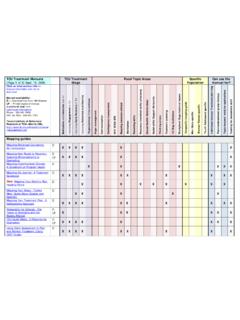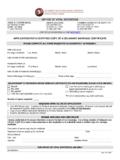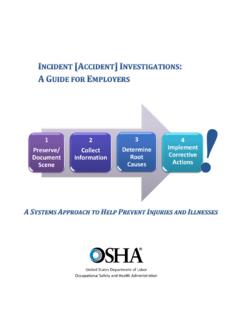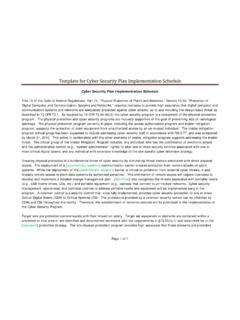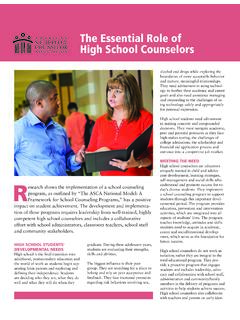Transcription of Treating Adults from Dysfunctional Families
1 Treating Adults from Dysfunctional FamiliesJudith E. Pierson, to 34 MillionFamily DynamicsUnpredictabilityAbuseNeglectLove is inconsistentChildren parentifiedFeelings okay for Dysfunctional parent onlyChildren can t bring friends homeChildren hide in their roomsFighting and Explosive AngerChildren belittled, controlled, mockedIntergenerational patterns of dysfunctionRepeated family crisesAbsence of safe & structured home lifeDenial is the normThis isn t a Norman Rockwell HomeRules in the FamilyDon t talkDon t trustDon t feelRoles in the FamilyResponsible / Parentified ChildFamily HeroEnablerScapegoatClownLost ChildMany of us grew up this s of 1,500 Smith College School of Social Work graduates were parentified child (Lackie, 1983)
2 Social worker students had twice the levels of family addiction as business students (Marsh, 1988)31% of social work/counseling students had an alcoholic parent;34% defined self as parentied;60% grew up in Dysfunctional family (Pierson, 1994)This enhances our work and is only a liability if we don t treat ourselves as well as we treat out Family Rules & RolesExerciseAnswer Questions 1 & 2 on HandoutThe unexamined past can dictate the FamilyExerciseQuestion 3 Long Term ImpactStrong need for controlDon t know what s normal Extremely self-criticalDifficulty with intimate relationshipsProblems recognizing and expressing feelingsDifficulty expressing needsExaggerated sense of responsibilityPerfectionistAll or nothing thinkingAnxious when things are calmOver-react to changeHypervigilantFear of AngerDifficulty being spontaneous Risk of alcoholismBelief they are loveable or goodHealthy Shame vs.
3 Toxic ShameHealthy shame to be human is to be imperfectToxic shame I am inherently flawed and worthlessShame Vs. GuiltGuilt My behavior is badShame I am badGuilt allows changeShame is immobilizingCausesCore identify shaped by distorted blame themselves for parents failuresNot adequately affirmedShame experiences stick to one anotherHow to people protect against feelings of shame?Avoidance strategiesWithdraw strategiesSelf attack strategiesAttack others strategiesAddressing ShameRecognizing shame, defuses itHealthy mirroring Challenge overgeneralilzation one mistake, I will always fail, I m a failureHelp clients reframe mistakesTeach compassionate self-talkExpose the inner criticCircle of Healing MessagesExerciseTaming the Inner CriticIdentify criticismHelp client understand where they learned thisLook at appropriateness of beliefWhat purpose did it serve in childhood.
4 Befriend itSeparate truth from the distortionTeach a nurturing / balanced responseShame Exercise See HandoutPrincess ImperfectUnique Strengths of Adult ChildrenIncreased capacity for empathyHeightened sensitivity and awarenessGreater emotional intelligenceTake less for grantedInner strength & resilienceMaturity, competency, ability to problem solveCommitment to having a healthy familyWorking with Adults from Dysfunctional Families Provide a framework for understanding their behaviorRules & Roles in the familyImpact on adult behaviorLook at behaviors with compassionMost embarrassing symptom is the part of you that refuses to lie about the fact that you hurt them break the rule of silenceHelp them identify and express feelings in safe waysHelp them to acknowledge & express their needs barriers to Expressing NeedsIgnoranceLimiting and inaccurate beliefs If you loved me.
5 You d know what I need FearLow self-esteemPrideSee handout on Needs Teach them about the realities of askingEncourage giving backLinehan s work with borderlines led to DBT which includes teaching people how to express needs in healthy small, with someone safe, check out fearHealing the Wounded Inner ChildGoal is to learn to stop Treating themselves the way they were treated as this through positive self-talk and building healthy support AnalysisThree ego states:AdultParentCritical ParentNurturing ParentChildAdapted ChildNatural ChildModel corrective emotional experience Not either / or Need love from within and from outside sourcesStrengthen nurturing voiceModify the now counter-productive coping of the adapted childModel then have them practiceTechniques See HandoutVisualize meeting the inner childVisualize nurturing parentWork with dialogue between child and parent voices Capacchione s writing exerciseEMDR & GestaltDivine looking downApply in real lifeWork with FeelingsRegular check-in sSafe ways to release feelingsTechniques to evoke emotion (empty chair, hitting pillows)
6 Other suggestionsPut out pictures of younger selfWrite letters to inner childUtilize workbooksEncourage good self careFrame destructive behavior as repeating the techniquesHelp them build support networksTeach interdependenceHelp them learn to share their feelingsEncourage them to educate their support networkAddress fears about seeking supportCreate a list of people they can call and ways to self-sootheNegotiate parenting time Find safe ways to be nurtured (ex. massage)Identify mentorsHave them read and take classes on self-careSupport groupsPair up with a friend and coach one another on a goalUtilize internet resourcesWorking with GroupsUsual guidelines on confidentiality, arriving on time but also ask for what you want 100% of the time Screen can they regulate feelings and manage behaviorFirst group each person shares and then gets a response from each group memberStart with psychoeducationalProcess can focus on replaying rolesUse group as safe place to express feelings and needsLeader can bring a topic & activityClients may also suggest topicsIf your compassion does not include yourself, it is BuddhaAlthough the world is full of suffering, it is also full of the overcoming of it.
7 Helen Keller

